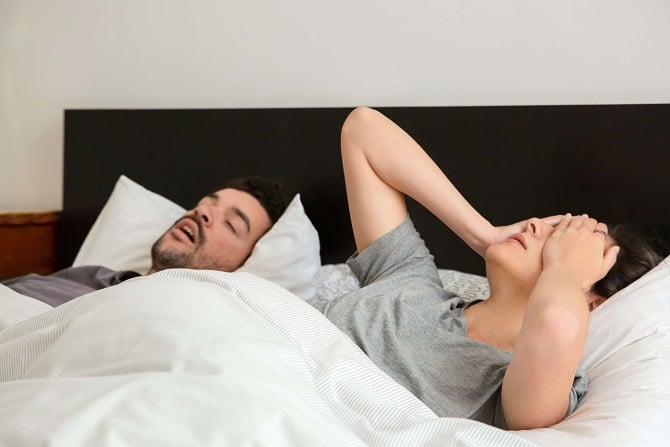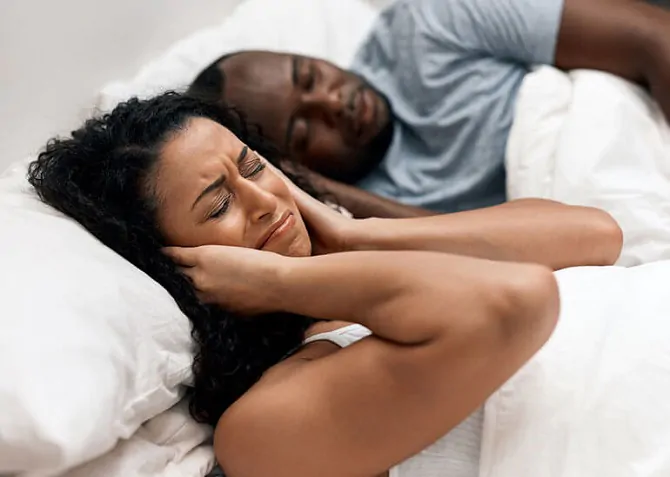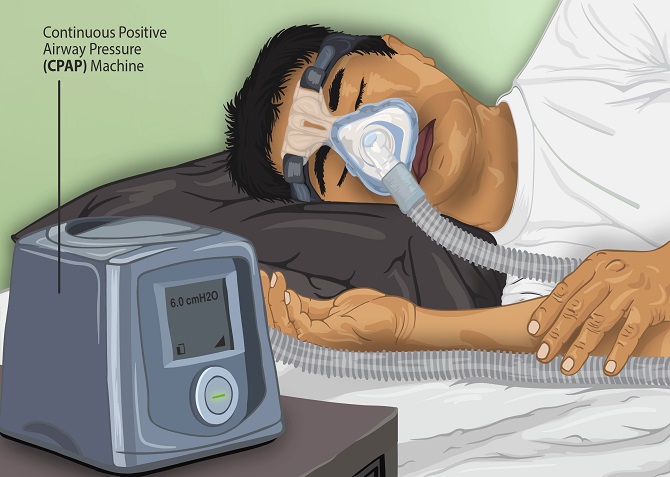
The Dangers of Sleep Apnoea
On average, a person will sleep for around 200,000 hours in their lifetime. That’s rather a lot. As we have said many times across this blog: Sleep. Is. Very. Important.
Waking up in the morning after what you thought was a full night’s sleep but still feeling unrested is usually a sign of something disrupting your sleep. The most common sleep disorder than can really mess with your night is Sleep Apnoea, and it is one of the least pleasant (especially for those around you!)
What is Sleep Apnoea?
The scientific explanation of what sleep apnoea is “a breathing-related sleep disorder characterised by irregular breathing patterns during sleep.”
Not to scare you, but it’s basically a lack of air.
Snoring is a recognisable symptom of sleep apnoea and you can probably guess by the roaring and snorting that air isn’t getting through as easily as it should be.

Diagnosing Sleep Apnoea
It might be difficult to diagnose yourself with sleep apnoea as, obviously, you’re asleep! People who suffer from it are rarely aware of the problem as they are having the breathing problems during sleep, but a partner might be able to help. There are three different types of sleep apnoea: obstructive, central and mixed which, as you could probably tell, is a combination of both obstructive and central.
Symptoms
As we have said before, snoring is an extremely obvious primary symptom but it might not be obvious to you if you’re asleep. If you haven’t got family members around to make you aware of your night-time impressions of a pneumatic drill, there are other symptoms that you yourself can look out for:
- Sore or dry throat
- Often waking-up with a snort or a choke
- Daytime sleepiness
- Lack of energy
- Morning headaches
- Forgetfulness
- Difficulties in concentrating
- Mood changes
- Decreased libido
Who is Most at Risk?
In the UK there are around one and a half million people who suffer from sleep apnoea, with up to 85% of sufferers being undiagnosed.
Sleep apnoea affects both men and women, adults and children, but there are certain groups of people who are more likely to have or develop the sleep issue.
Sorry guys, but men over the age of 40 and who are *ahem* larger have a higher risk.

Possible Consequences of Sleep Apnoea
A little snore-up might seem to be nothing but an annoyance to you and those around you. But it only seems that way. We try not to be too heavy with our blog but we always try and make sure we fully explain any sleep issues that could cause a serious negative effect to your health and happiness.
So, when we say that sleep apnoea is one of the more serious sleep disorders, we really aren’t joking.
If left untreated, sleep apnoea can put you at a higher risk of accidents in your car or at work due to a lack of concentration, and it can also cause several serious long-term problems:
- Increased risk of developing type 2 diabetes
- High blood pressure
- Heart disease
- Acid reflux
- Obesity
What Can be Done?

The best thing you can do is visit your doctor – after all, we are talking about a serious health condition. There are a number of ways they can treat you, some less pleasant than others but all would help you get a better sleep:
- Most common treatment is via the use of a specialised CPAP (Continuous Positive Airway Pressure) which keeps the sufferer’s airways open by gently blowing air down the throat.
- Medication, but with limited effectiveness.
- A special mouthpiece – usually the same type that is used by standard snorers – custom made by a dentist or orthodontist.
- Surgical intervention to widen the breathing passages. While not a major operation, this is seen as a last resort.
What Can You do Yourself?
Before going to your doctor, there a few things you can do yourself to help reduce the possibility of sleep apnoea:
- Avoid drinking excessive amounts of alcohol to help you sleep.
- Avoid using excessive amounts of sleeping pills and tranquilisers.
- If you are overweight, a little weight loss can make a huge difference.
- Try and sleep on your side rather than on your back to help keep the airways open.
- Keep your nasal passages open by using sprays or certain allergy medicines, but make sure you consult your doctor!
- If you are a smoker, giving up will help your airways stay open during the night (and should be a priority for your general health!)
Something else you can do to try and help alleviate the problems connected to sleep apnoea is make a bedroom with the best possible conditions for a great night's sleep - fresh air, no dust and a clean and comfortable mattress.








Leave a Reply